To celebrate excellence in pathology practice and promote high standards in pathology education, training and research to deliver the best patient care, the College launched the RCPath Achievement Awards (formerly known as the RCPath Excellence Awards)
Nominations were invited for teams and individuals from all professional backgrounds and disciplines. The winners were announced at the College's virtual Council Meeting on 19 November 2020.
Contribution to education
Dr Christopher Smith Clinical Microbiology and Public Health Laboratory Addenbrooke's Hospital, Cambridge

Since Covid-19 began, virologist and Naked Scientist Dr Chris Smith has been a frequent presence on television and radio. On BBC Breakfast, the News Channel, Radio 4's PM and World Tonight programmes, and Jeremy Vine's Radio 2 and TV shows, Chris has spoken to millions. He has contributed clear, reassuring messages and advice about the pandemic and the effect it is having on people's lives.
Dr Michael Coutts,West Kent Gynaecological Oncology Centre, Maidstone and Tunbridge Wells NHS Trust Hospital, Kent
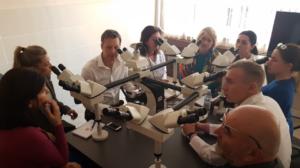
In response to a request from the International Cervical Cancer Prevention Association, Michael volunteered to visit Moldova and assess laboratory equipment and practices. He visited several clinical laboratories, discussed training needs and a training plan. Subsequently two pathologists from Moldova were trained by him at Maidstone Hospital in Kent. He contributed to several training workshops held in Moldova for 15 Moldovan pathologists, made recommendations on laboratory service requirements, developed a curriculum and now provides ongoing online training.
Professor Ismail Matalk, Department of Pathology and Laboratory Medicine, Jordan University of Science and Technology
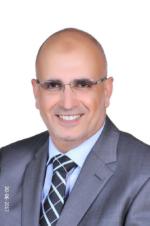
Professor Matalka has served as CEO of the KAUH, which is the main tertiary hospital in North of Jordan and as the Dean of the School of Medicine in JUST, and the Vice Dean and Chair of Pathology and Laboratory Medicine for about 13 years. He is the Past President of the Arab Division of International Academy of Pathology and the Jordanian Society of Pathologists. Since May 2015 he has been working as the International Advisor of the Royal College of Pathologists for the MENA region. He has been the Secretary of the Arab Board (AB) of Pathology and appointed as a member of the higher council of the AB. He served as Chairman of the Arab School of Pathology from 2007-2013.
Through the different positions held thus far, his contribution to promoting pathology has extended beyond his department and Jordan to the wider region.
Professor Simon Lawrence Priestnall, Dept Pathobiology & Population Sciences, The Royal Veterinary College, Hertfordshire
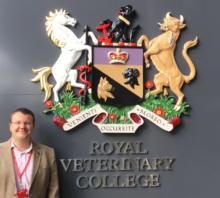
Simon’s commitment to training veterinary undergraduates, postgraduates and pathology colleagues, is evidenced by the scope of his pathology teaching, his postgraduate certificate in veterinary education and his contribution to the Cornell Leadership programme. He is resolute in his desire to encourage all, including school children and veterinarians, to consider pathology as a speciality. He has organised numerous conferences, and as a speaker at the British Society of Pathology, the Davis-Thompson Foundation (organising travel bursaries for trainees) and RCPath, Simon has demonstrated high standards in pathology education and training, supporting best patient care for animals.
Innovation in pathology practice
Dr Rebecca Cardigan and contingency blood components team, NHS Blood & Transplant
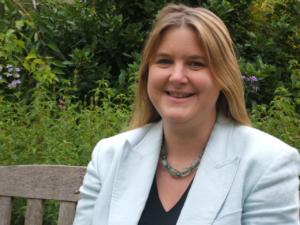
At the outset of the COVID-19 pandemic, one realistic scenario was that the number of blood donors could be severely reduced. Dr Cardigan convened a small national team of relevant clinical, scientific and blood chain supply experts to consider what further research & development activity could be done rapidly to provide resilience should demand for blood outstrip supply.
From a long list, two options were prioritised for development. Firstly, to explore the clinical safety and impact of a temporary extension of the shelf life of red cells from 35 to 42 days. Secondly, to provide platelet concentrates comprising a reduced dose of platelets. Dr Cardigan’s team in the Component Development Laboratory modelled and validated these by laboratory studies. The data was swiftly used to produce new temporary specifications for blood that could be safely used as a contingency in the UK should the need arise. Thankfully, throughout COVID NHSBT has been able to maintain supply of blood to hospitals and these measures remain as a reserve option.
Dr Bernie Croal and the Scottish National Demand Optimisation Group, Aberdeen
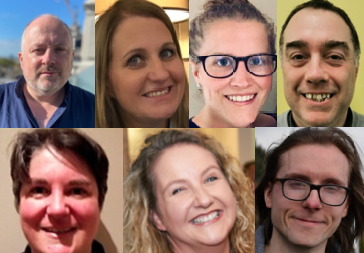
The group chaired by Dr Croal, has developed many innovative practices and services. The program has coordinated a national approach to demand optimisation bringing together many examples of novel quality improvement initiatives, facilitating wider implementation through the networks and Health Boards. Linking in with primary care, the program has also developed a ground breaking Online Interactive Atlas of Variation, which allows both laboratory services and GP practices (across the whole country) to follow trends in many common test requests and compare their use to peer groups and national levels.
Dr R Doffinger, Ms Sally Houghton, Dr Ania Mansson, Department of Clinical Biochemistry and Immunology, Addenbrooke's Hospital, Cambridge
During the pandemic the Clinical Immunology Department maintained its routine diagnostic service, and in addition, supported the pioneering investigation of the immunopathology of COVID-19 by supporting clinical research at Addenbrookes and Papworth hospitals. It set up and implemented a SARS-CoV-2 serology from scratch and took the assay to inclusion in UKAS scope in September 2020.
In addition, they identified novel pathways of immunodeficiency and pathogenesis resulting in a national and internationally recognised service, and establishing an accredited diagnostic service to defects in the cytokine and innate immune pathways.
Dr Jenny McKay IDEXX UK Pathology Team, IDEXX Laboratories, Wetherby

The pathology team in IDEXX UK were the first diagnostic laboratory to implement digital pathology for all their diagnostic pathologists giving their employees the flexibility of working remotely. The use of digitized cytology and histopathology images using the Philips pathology slide scanner has massively reduced turnaround time for samples, providing a pathology service to practicing veterinarians that is second to none. The team work closely with their technical staff ensuring the quality of the slides and images are excellent allowing for accurate diagnoses leading to the best patient care.
Dr Joel Paul & Virology Team, Northern Care Alliance – Department of Microbiology, Royal Oldham Hospital
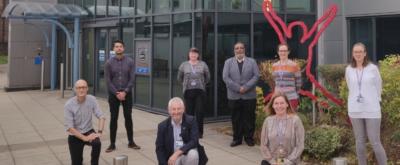
One of the key challenges faced by diagnostic virology in the peak of the first wave of COVID-19 in UK was a national shortage of PCR extraction kits and associated material. The virology department of Royal Oldham Hospital which is a pillar 1 lab for six acute NHS Trust hospitals in Greater Manchester rapidly responded to this challenge by quickly developing, validating and implementing an extraction free PCR for SARS-CoV-2 using the existing PCR testing facilities. This was acknowledged regionally and nationally as a groundbreaking rapid response to a problem by deploying an innovative method to continue the COVID-19 PCR diagnosis of symptomatic patients and staff.
Patient safety
Dr Tina Dutt, Liverpool University Hospitals NHS Foundation Trust.
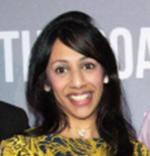
Dr Dutt is a role model in the field of haematology and ambassador for the highest standards of patient care in Rare Disease. She provides inspirational leadership for her team and a compassionate commitment to patient safety. This is evidenced by a culmination of landmark contributions at local and national level. Dr Dutt has successfully embedded a patient safety culture within the management of patients with the critical, haematological condition Thrombotic Thrombocytopenic Purpura, (TTP). She has championed the voices of patients and carers and received a ‘Patients Choice’ Award voted for by patients.
Significant contribution to specialty
Cervical Screening London (CSL) team Health Services Laboratories, London
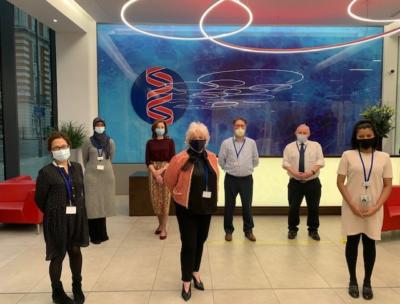
The team at Cervical Screening London (CSL) deserve to be recognised. Utilising local knowledge and experience from Australian colleagues, they have delivered a world-class cervical screening service to the women of London.
Working to incredibly tight deadlines, and cognisant of the importance of supporting individual staff, CSL successfully managed the complex amalgamation of ten existing screening sites creating a consolidated HPV primary screening service in a new state-of-the-art laboratory.
Dr P Randell clinical lead, Dr A Cox scientific lead and Dr P Pantelidis managerial lead - COVID-19 Diagnostic Testing Service North West London Pathology Trust (NWLP), Charing Cross Hospital, London
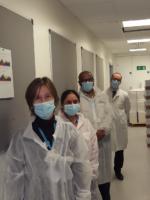
Nominated for their outstanding achievements in establishing a comprehensive SARS CoV-2 PCR and serological diagnostic service. Our service drew on the talents within NWLP (virology, microbiology, immunology, H&I, point of care, quality management, information technology) to forge external collaborations with clinicians in our partner NHS Trusts and community care, and scientists at Imperial College London to provide a clinically responsive high quality diagnostic service for patients and healthcare staff. We have extremely positive feedback from our NHS services for our rapid response at short notice to test large number of healthcare staff (up to 2,500 tests a day) early in the COVID-19 pandemic. (Dr Arthi Anand & Dr Panagiotis Pantelidis are not in this picture)
Dr Brian Hanley, North West London Pathology, Cellular Pathology, Charing Cross Hospital, London
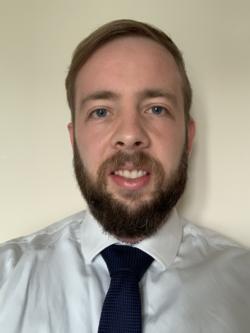
Dr Brian Hanley’s post-mortem examinations of COVID-19 patients illustrated the continued importance of autopsy in helping to understand the pathophysiology of COVID-19 and its complications, and in advancing patient monitoring and treatment.
Dr Hanley co-developed the College guidelines for COVID-19 autopsies; approached and obtained consent from families, helped carry out the autopsies and write up the findings, created a tissue bank-hosted sub-collection of samples, established a network of; 20 research collaborators and co-ordinated sample distribution, gave numerous national and international presentations to disseminate his findings; and carried out his own tissue-based molecular investigations. His dedication to this vital work is truly extraordinary in a specialist trainee. He has demonstrated many skills, including sensitive interactions with bereaved families, excellent presentation skills, and post-mortem and molecular analysis technical ability. The output of this hard work includes a priceless COVID-19 bio-bank and an impressive list of publications and invited talks.
Professor Cheng Hock-Toh, The Roald Dahl Haemostasis and Thrombosis Centre, Liverpool University Hospitals NHS Foundation Trust

Professor Cheng Hock-Toh visionary and multi-faceted skills have led to award-winning NHS service improvements, internationally leading translational research, creation of enterprise, educational excellence, mentoring impact and international professional leadership. In the last three years, he has been elected as President of the British Society for Haematology (BSH) and as Academic Vice-President of the Royal College of Physicians London (RCP) – the first BAME doctor to hold these elected positions. At the same time, he was also National Specialty Lead (Haematology) at the National Institute for Health Research (NIHR) and is now the Chair of the National Blood Transfusion Committee. Professor Toh’s impact has been felt by patients, trainees and peers across the UK and abroad.
Dr C Paul Johnson, Forensic Pathology Unit,The Royal Liverpool Hospital
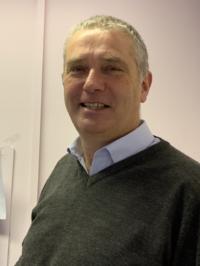
Dr Johnson has been active on the College’s Speciality Advisory Committee in a number of roles including chair, and chair of forensic pathology examiners. He has also been the lead for training in the College and led the development of the speciality’s current curriculum.
He has sat on the Forensic Pathology Specialist Group for a number of years and he is noted to have contributed significantly to the current version of the Code of Practice for forensic pathologists held by the Forensic Science Regulator and co-badged by the College as well as assisting the Home Office (and some overseas jurisdictions) on suitability of applicants for registration as forensic pathologists. Locally he is the program lead for forensic pathology trainees in Liverpool.

